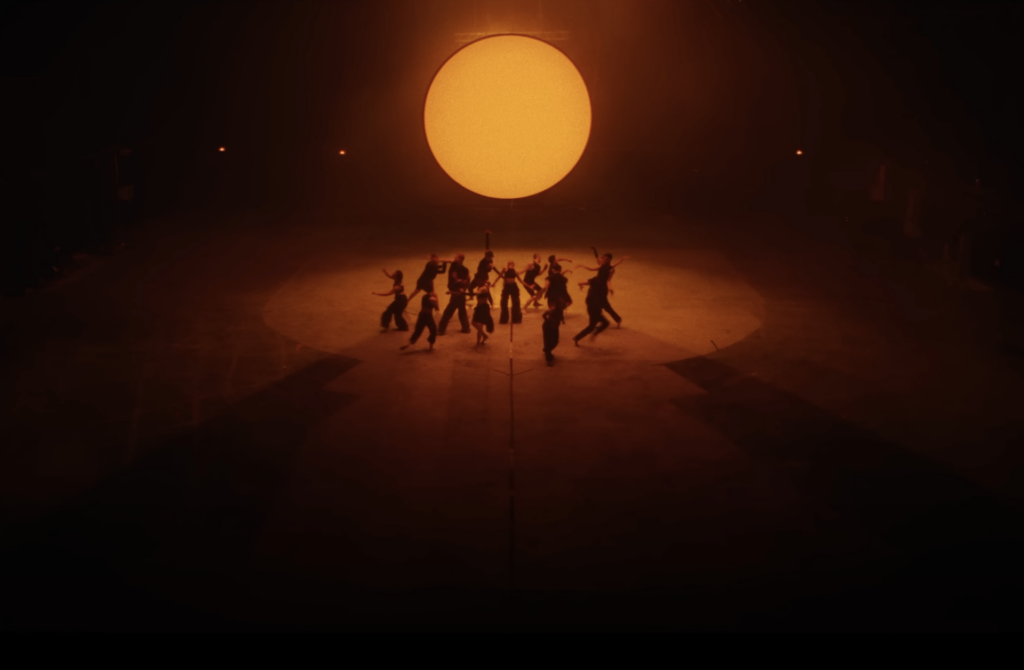Israel to perform at Eurovision. Expect protests, machine guns, and drones
By Erik English | May 8, 2024
 Screenshot from Eden Golan’s Eurovision music video, “Hurricane,” which will represent Israel at the first semi-final on Thursday.
Screenshot from Eden Golan’s Eurovision music video, “Hurricane,” which will represent Israel at the first semi-final on Thursday.
The Swedish city of Malmö is on high alert this week as authorities expect large-scale protests objecting to Israel’s participation in Eurovision amid the ongoing war in Gaza. The police have called in reinforcements from Denmark and Norway, and are in some cases arming them with submachine guns.
Pro-Palestinian protestors are staging large demonstrations calling for Israel to be disqualified from the world’s largest song contest. Eden Golan, the 20-year-old Israeli artist who will perform on Thursday, has been warned to stay in her hotel room when not on stage because of security concerns.
Golan’s song, titled “October Rain” was believed to be a reference to the October 7th Hamas attacks that Israel says killed roughly 1,200 people. Event organizers, who officially do not allow political content, requested the song title and lyrics be changed to avoid disqualification. The revised song, now titled, “Hurricane,” replaced the original lyrics—“There’s no air left to breathe” and “They were all good children, each one of them,” with “Every day I’m losing my mind” and “I’m still broken from this Hurricane.”
The expected demonstrations come on the heels of pro-Palestinian protests across US universities that have dominated news coverage in recent weeks and, in some cases, overshadowed coverage of the horrific events themselves. The Israeli campaign in Gaza following last fall’s Hamas attacks has resulted in nearly 35,000 deaths so far—more than 14,500 of them children. Over the weekend, a top UN official said that there was now a “full-blown famine” in Northern Gaza, which the Famine Early Warning System Network has cautioned was “imminent” since March.
Meanwhile, the Israeli military has been warning residents of Rafah to evacuate ahead of an expected invasion of the city. The United States and other international allies have urged Israel not to invade but Israel’s prime minister, Benjamin Netanyahu, appears determined to disregard them. Back in November, UN ambassadors condemned comments from Amihai Eliyahu, Israel’s Heritage Minister, who had suggested dropping a nuclear bomb on the Gaza Strip. While they may not have gone ahead with that plan, much of Gaza today looks as though they had.
Eurovision’s political past. The controversy is the latest in a long line of political upheavals that have dominated Eurovision since its inception. Originally intended to test nascent television broadcasting technology, the first Eurovision Song Contest in 1956 only featured seven countries. One of those countries, West Germany, sent Walter Andreas Strauss, who was a Jewish Holocaust survivor, as its first performer—which was seen as an attempt to distance itself from its Nazi past.
The political nature of the performances would continue to grow as membership expanded. Eligibility for the contest is based on membership in the European Broadcast Union—an alliance of public broadcasters—rather than physical location, which is why so many of the participants are not European, geographically speaking. Winning the competition has become an avenue to attract mega-events and tourism, while also exercising soft power and fostering a sense of diplomatic legitimacy.
Many countries would use the contest to appeal for peace and de-escalation during the Cold War. Monaco’s entry in 1967, “Boum Badaboum,” contemplated life under the threat of nuclear war. Others used the contest as an act of defiance. Israel’s 2007 entry, “Push the Button,” was an indirect commentary about the threat of Iran’s nuclear capabilities.
The Bulletin reported on the contest last year, after organizers banned Russia from participating because of its 2022 invasion of Ukraine; the reasoning was that allowing Russia to compete would “bring the competition into disrepute.” Many countries expressed solidarity for Ukraine, and the Croatian performance in 2023 even went so far as to mock dictators like Russia’s Vladimir Putin. In 2021, organizers disqualified Belarus from participation because their selected song mocked anti-government protests after the country’s leader, Alexander Lukashenko, was re-elected in an election that the United States, the European Union, and many other nations deemed unfree and unfair.
Given those previous disqualifications, critics asked whether Israel should be allowed to compete, given the extent of death and destruction Israel has inflicted across Gaza, and the international alarm its actions have caused. Nevertheless, this year, despite large-scale protests and many artists calling for Israel’s disqualification, the Middle Eastern nation has been allowed to compete.
Throughout the competition’s history, no participating country has been as consistently controversial as Israel.
Israel and its neighbors. Israel performed at Eurovision for the first time in 1973, less than a year after the terrorist attacks at the Munich Olympic games, in which two Israeli Olympians were killed and nine others taken hostage by Palestinian militants from the Black September terrorist group. (A botched rescue attempt resulted in the deaths of the remaining hostages; five members of Black September died as well.)
Since then, Israel’s participation in Eurovision has resulted in higher levels of security for the contest and drawn protests. It has also been a barometer for tracking Israel’s relationship with its neighbors.
Since Israel began participating, some Arab states have refused to even broadcast the contest. (Others have refused to participate: Algeria, Egypt, Tunisia, Lebanon, Jordan, and Libya are all members of the European Broadcast Union with eligibility to participate, but decline based on Israel’s inclusion.) In 1978, many Arab countries aired the contest, but ran a commercial during Israel’s performance. Jordan chose to broadcast flowers on the screen instead of the Israeli performance—and when Israel won, Jordan announced over their broadcast that Belgium had won instead.
Morocco competed in 1980, when Israel was not in the running, but has not taken part in the contest since.
However, there have been attempts to soothe regional tensions at Eurovision. In 2009, the Israeli entry consisted of Jewish and Arab Israelis who sang “There Must Be Another Way” in Arabic, English, and Hebrew. In 2000, the Israeli band PingPong closed their performance by waving Israeli and Syrian flags.
Flags are a common flashpoint at the contest, and the organizers have vowed to confiscate any Palestinian flags this year, but that’s not really a surprise. During the 2019 contest in Tel Aviv, the Icelandic band “Hatari” displayed Palestinian flags during a section of the event, incurring a €5,000 fine to their broadcaster.
Dean Vuletic, an expert on Eurovision and international politics, recently told The New York Times that Eurovision had “clamped down on flags in 2016, in part to prevent the display of the symbols of terrorist groups like the Islamic State. They also banned flags from disputed territories and those promoting separatist causes—much to the annoyance of fans from Kosovo and Catalonia.” Even the European Union flag is not allowed, which will perhaps be most apparent when the Netherlands’ Joost Klein sings his pro-EU song, “Europapa,” which celebrates freedom of movement.
The view from Malmö. This week, 37 countries are participating in the annual song contest. While the favorite to win is an entry by Croatia—a poppy song that laments young Croatians leaving the country to find opportunity elsewhere—the most closely watched will surely be the Israeli entrant, Eden Golan. In an interview with Reuters on Monday, Golan said: “I come here to show my voice, to share my love, my gift from God and to hopefully make people feel something and leave a mark in their souls and to unite by music.”
Meanwhile, in Gaza on Tuesday morning, Israeli tanks rolled into Rafah, blocking the border between Gaza and Egypt and the flow of aid. Netanyahu continues to press the conflict, despite pressure from the United States to accept a ceasefire deal—a deal that Hamas has already agreed to, and which includes the release of Israeli hostages still being held in Gaza (a major justification for sending the Israeli military into Gaza, according to Netanyahu).
Back in Malmö, security officials have announced that they will be monitoring crowds with drone-mounted cameras. Swedish authorities said they expect the Eurovision arena to be a “priority target” for terrorist groups.
Together, we make the world safer.
The Bulletin elevates expert voices above the noise. But as an independent nonprofit organization, our operations depend on the support of readers like you. Help us continue to deliver quality journalism that holds leaders accountable. Your support of our work at any level is important. In return, we promise our coverage will be understandable, influential, vigilant, solution-oriented, and fair-minded. Together we can make a difference.















